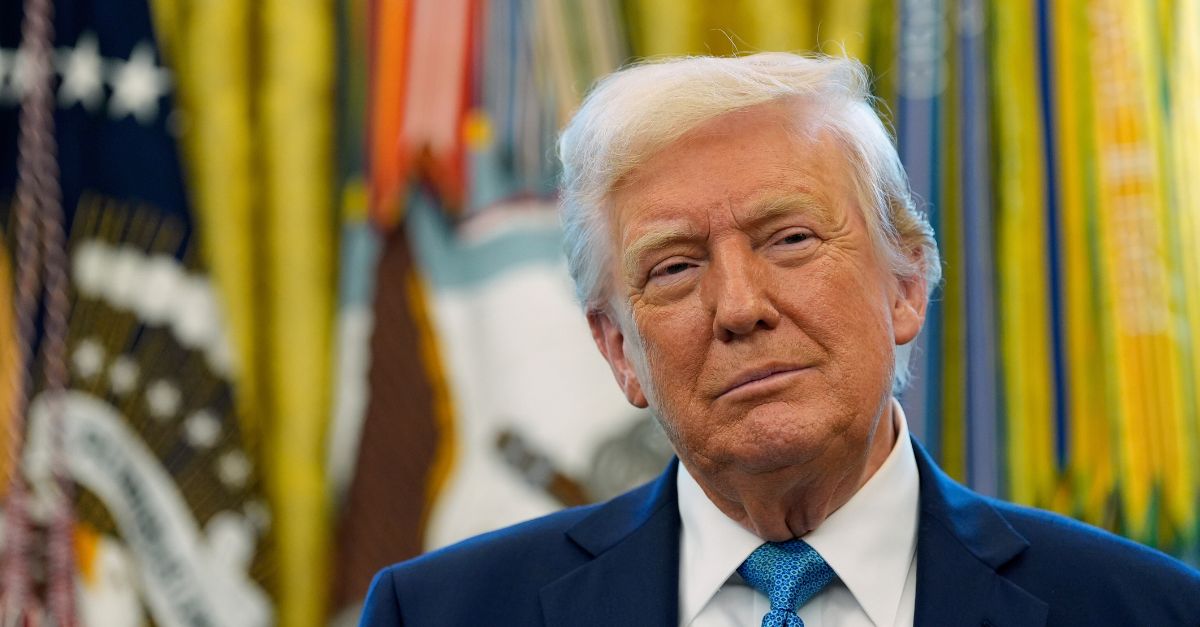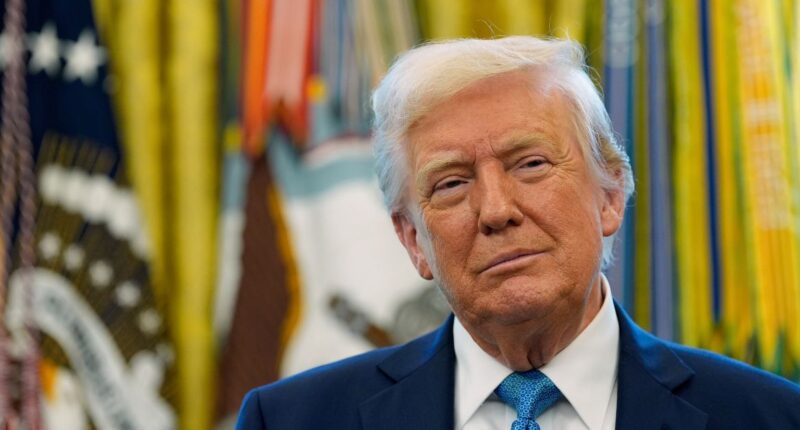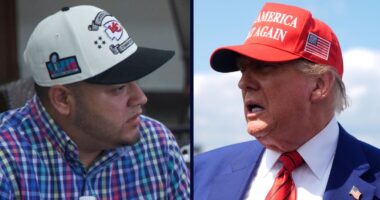
President Donald Trump observes as Treasury Secretary Scott Bessent takes part in a ceremonial swearing in of Paul Atkins as the chairman of the Securities and Exchange Commission, in the Oval Office of the White House, on Tuesday, April 22, 2025, in Washington (AP Photo/Alex Brandon).
Two states located in the Pacific Northwest are urging a federal court to prevent President Donald Trump and his administration from intervening in their well-established election laws.
On March 25, the 45th and 47th president issued Executive Order 14248, entitled: “Preserving and Protecting the Integrity of American Elections.” The order broadly aims to alter the way elections are conducted in the nation by, among other measures, attempting to mandate that all voters provide evidence of their citizenship through formal documentation and discontinuing vote-by-mail systems that tally ballots postmarked before, but received after, Election Day.
In Oregon and Washington, the default voting mechanism is a postal ballot; such vote-by-mail systems have been in place for decades.
On Thursday, in a 35-page motion for partial summary judgment, the states asked U.S. District Judge John H. Chun, a Joe Biden appointee, to permanently enjoin multiple sections of Trump’s order as unconstitutional and ultra vires, or, beyond the president’s power.
Love true crime? Sign up for our newsletter, The Law&Crime Docket, to get the latest real-life crime stories delivered right to your inbox.
“The Constitution is clear: States are responsible for regulating ‘[t]he Times, Places and Manner’ of federal elections, subject only to alteration by Congress,” the motion begins. “The President has no constitutional authority to interfere with state election laws. Nor has Congress given the President statutory authority to do so.”
The plaintiffs are looking for a quick end to the litigation at the district court level by arguing the far-reaching the order simply lacks any authority to undo electoral prerogatives long-exercised by the states.
“Among other things, this order purports to impose new restrictions on registering to vote, set aside long-standing and widespread state laws setting ballot-return deadlines, and dictate which voting machines can be federally certified,” the motion reads. “But the President has no authority to do any of this. And by attempting to assert unilateral control over elections, the President is threatening the foundation of our democracy.”
And without such authority, the plaintiffs say, Trump’s order has no merit — and any agencies enforcing it would be breaking the law.
“The Framers carefully divided power over elections between the States and Congress to prevent the accumulation of power in any one source,” the motion continues. “The President’s illegal effort to consolidate his nonexistent power over elections flies in the face of that principle.”
Chief among the plaintiffs’ complaints are the government’s efforts to prohibit states from accepting mail ballots received after Election Day. In Washington and Oregon, such votes are counted “as long as the ballots were cast on or before election day,” the motion explains.
Trump, for his part, likens such laws to “allowing persons who arrive 3 days after Election Day, perhaps after a winner has been declared, to vote in person at a former voting precinct.”
To that end, the government has sought to condition “any available funding to a State” on the exclusion of ballots received after Election Day. In another case challenging the executive order, the government advanced the notion of using “criminal” prosecutions to secure compliance with the proposed ban.
“This is entirely unlawful,” the motion continues. “Federal law does not create a ballot-receipt deadline. The statutes cited in the Executive Order (2 U.S.C. § 7 and 3 U.S.C. § 1) are conspicuously silent on when timely-cast ballots must be received. The President has no authority to invent new election regulations. Any effort by the U.S. Attorney General to enforce the made-up ballot-receipt deadline is unlawful, as is imposing new, non-congressionally approved conditions on federal funding.”
The motion goes on to argue that Trump’s order “relies on a patently incorrect reading of two federal statutes” to try and create a “ballot receipt deadline of Election Day for all methods of voting.” Instead, the plaintiffs say, the statutes “simply establish a uniform day for federal general elections” and do not contain the words “ballot” or “deadline” at all.
From the motion, at length:
The interpretive task here is straightforward. When interpreting laws adopted under the Elections Clause, “the reasonable assumption is that the statutory text accurately communicates the scope of Congress’s pre-emptive intent.” Such legislation supersedes state laws so far as they are inconsistent, but “no farther[.]” The statutory text is clear. It sets a date on which the election must be held. State laws that count ballots postmarked by election day are entirely consistent with the federal election day statutes. The voter has made a final and irreversible selection by election day, just like a voter who casts a ballot at a polling site. The federal election day statutes are silent on these deadlines and so the state laws are not preempted.
“Properly construed, nothing in the text of [either federal law cited by Trump] purports to require that election officials receive ballots by election day,” the motion goes on. “Under the Elections Clause, regulating this aspect of the manner of federal elections is left to the States. The President has no authority to require that States reject ballots received after election day.”
Moving beyond their focused efforts to protect voting by mail in each state, the plaintiffs also argue presidents lack any power over elections.
“The President has no constitutional authority to alter voting system guidelines or to direct which voting systems are federally certified,” the motion continues. “Nothing in the Elections Clause gives the President control over any aspect of regulating elections.”
Washington and Oregon go on to note that Congress created election laws and a requisite agency — Election Assistance Commission — to deal with the type of granular election-focused regulation the disputed executive order purports to try and change. For that reason, the motion argues, Trump’s order “upends the statutory scheme” by trying to “replace statutorily required bipartisan consensus based on technical expertise with presidential whims based on conspiracy theories.”
“To prevent tyranny, the Framers intentionally divided power between the States and the Federal Government and separated the Federal Government’s powers among three branches,” the motion concludes. “In the Executive Order provisions challenged here, the President seeks to disregard constitutional limits on his power. In any context, this would be troubling, but it is especially so in the context of elections.”
The original complaint in the case can be read here.









